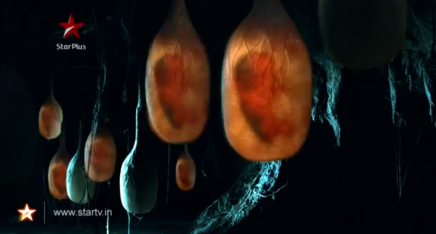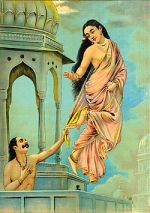Hastinapur now had its worthy king in the forest, repenting for his mistake, and his blind representative on the throne. Except for time (and me….huhahaha) no one knew what was to come.
One day (or maybe night), Dhritarashtra felt that the only way he could ensure his bloodline continued to rule the kingdom was that he had a son before Pandu. He expressed his desire to Gandhari who, being the most obedient wife ever, agreed.
Soon, the news spread in the kingdom that Gandhari was expecting. There was a wave of exhilaration in the kingdom as a pregnant queen promised a bright future ahead. But could a queen, who had willingly embraced darkness for life, bring brightness to the future of a kingdom? Time revealed it in the most evil of forms.
The news of Gandhari’s pregnancy also reached Pandu, who was residing in the forest with his wives. While he was happy for his brother and his wife, the news also dejected him as it made him aware of what he wasn’t capable of doing (or maybe not allowed to do, courtesy Rishi Kashyap’s curse). He shared his concern with his wives Kunti and Madri. On hearing her husband’s concern, Kunti revealed about a special privilege that she had in the form of a boon.
Long ago, even before she got married, Kunti had served Rishi Durvasa (who was a guest to her palace) so well that even the short-tempered rishi was impressed with her extra-ordinary hospitality and offered her a boon. Now Kunti was a teenager and had no idea what to ask for. She requested him to give her a boon that would help her in future. Rishi Durvasa foresaw here future with his yogic powers and gave her a boon in form of a mantra to be able to invite a devta and bear a son from him. (It was the accidental use of this boon before her wedding that Kunti ended up with a son of the Sun, Karna, whom she abandoned into the river to save her reputation).
She told Pandu that she could use these boons to invite devas and have sons from them to ensure that Pandu had sons too. Pandu found the idea of letting his wife bear sons through another men (sorry deva) awkward. This is when she reminded him that she wasn’t doing something new. Pandu himself was a son of niyog performed by Vyas and it had almost been the legacy of Kuru clan to have sons through niyog since the kings had often been sterile / impotent / cursed / uninterested / under-oath and as a result, could not give birth to sons. What’s more? Those niyog operations were through men or rishis but here it was the intervention of a god. Also, these sons would be born almost instantaneously, without Kunti having to lose her virginity or get pregnant.
Pandu agreed to it and told Kunti to invite none other than Dharma deva (the god of righteousness). He believed that the future generation could not ensure the security of Hastinapur unless there was establishment of dharma in the kingdom. And therefore, first and foremost quality that he desired in his son was his adherence to dharma. So Kunti summoned Dharma deva and received a son from him. Dharma deva stated that this son would always be patient, empathetic, brave and stable in war (yudh mein sthir) and he was named Yudhishthir.
Had it been completely up to the natural processes, Gandhari’s son would have been the eldest. But Kunti’s sudden use of the trump card resulted in an instant son without a pregnancy ended up breaking the dreams of both Gandhari and Dhritarashtra. Dhritarashtra felt that like he was not allowed to become the king because of his blindness, now his son would not be able to become the king because of his age. But more importantly, Gandhari’s pregnancy had prolonged and she did not deliver a child even after nine months.
Months passed but there was no sign of Gandhari giving birth to a child. Gandhari’s patience exceeded all limits and she ordered her maids to hit her belly with an iron rod and get her rid of what was inside her womb. What came out stunned everyone! It was a life-less ball of flesh. She wailed and her wailing brought tears in the eyes of every woman of Hastinapur. She questioned Rishi Vyas that why was her fate playing this game when she had been blessed for a hundred sons.
Rishi Vyas promised her to keep the dignity of that blessing. He divided that ball of flesh into hundred pieces and put them in hundred pots of ghee. He promised Gandhari that those hundred pieces would grow up to become her hundred sons. Gandhari, even at this moment of tension, expressed that she also always wanted a daughter. You can guess what Mr. Vyas did next.
Meanwhile in the forest, on learning that his elder brother was about to get hundred sons, Pandu did feel – Kaurav 100 aur Pandav 1, bahut na insaafi hai! So once again on Pandu’s will Kunti summoned Vayu Devta (god of wind) who gave her a son as strong as storms and tornados put together. When the child cried, he was so loud that out of fear Kunti dropped it on a rock. Poor rock…it was found cracked! This child was named Bheem.
Then on her own will, Kunti summoned Indra who gave her a son who was to grow up into an extremely skilled man and achieve great adulation from history, none other than Arjun. Now Pandu had started believing that Kunti was no less than a hen who laid golden eggs and he wanted to populate the poultry farm of his lineage with golden eggs from Kunti. This was also because he had got the news that his brother was about to become a father of hundred sons. But Kunti said that she could not bear any more sons as shastras didn’t allow a woman to be with more than four men (Ahem Ahem….really? Sun god, Pandu, Dharma god, Wind god, Indra – What’s the total?). So she shared the mantras with Madri who shot two targets with one arrow and invited Ashwini twins who gave her two sons – Nakul, the most handsome man and Sahadev, the most knowledgeable man.
And meanwhile, hundred sons and one daughter were born from the pots in Hastinapur. When the first pot broke, a child came out amidst the wailing of owls, jackals and crows on the streets. Kripacharya and Vidur suggested that since it was a bad omen, the child would bring misfortune to the kingdom and thus Dhritarashtra should get rid of the new born. While on one hand it was an inhumane task to kill a new-born based on the signals, Vidur argued that it was required for the larger good of the kingdom and also because Dhritarashtra would still be left with ninety-nine sons and one daughter anyway. Bheeshm did not speak.
But for the blind king, emotions overpowered logic and he clung to that son. This son was named Duryodhan, one who would be difficult to overpower. The remaining ninety-nine sons were also given names, and probably later, even ID badges so that they could be recognized. The one daughter born was named Dushala.
Thus was born the generation of supernatural warriors, sons of Pandu and sons of Dhritarashtra, who actually were the two opposing sides in the Kurukshetra war. But there is a long way to go, so let’s leave Hastinapur with its own moment of jubilation.







